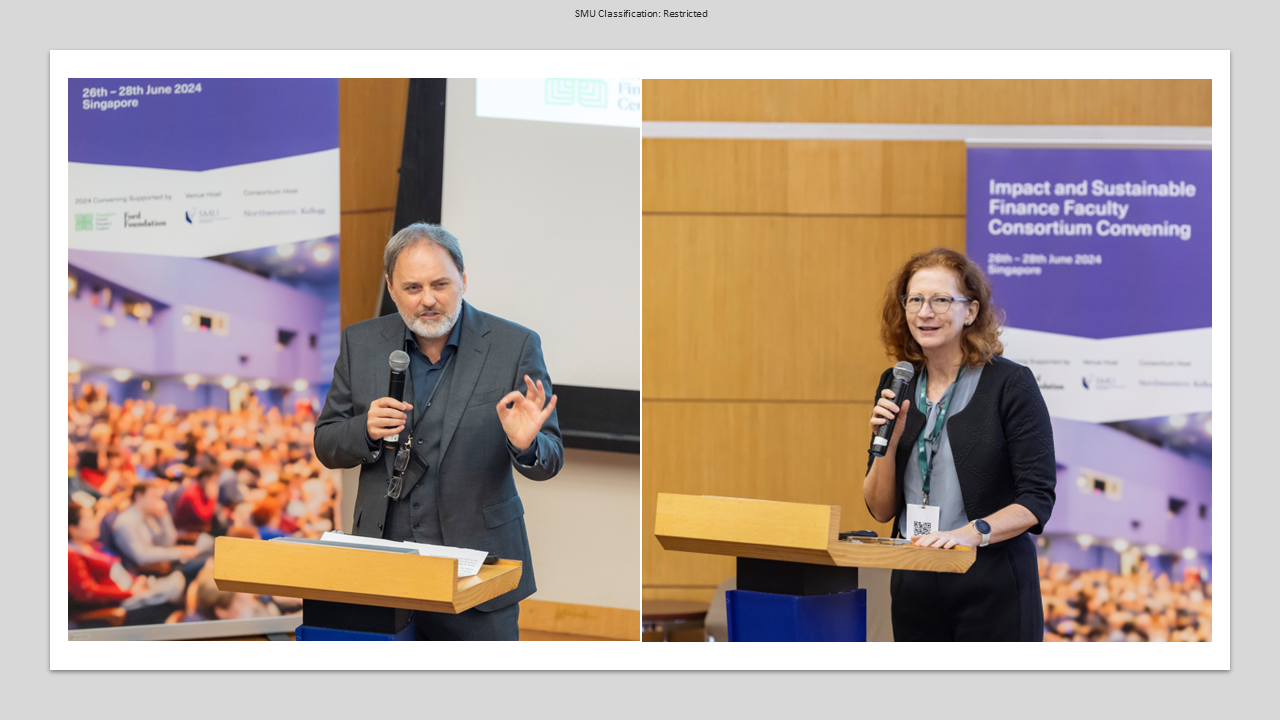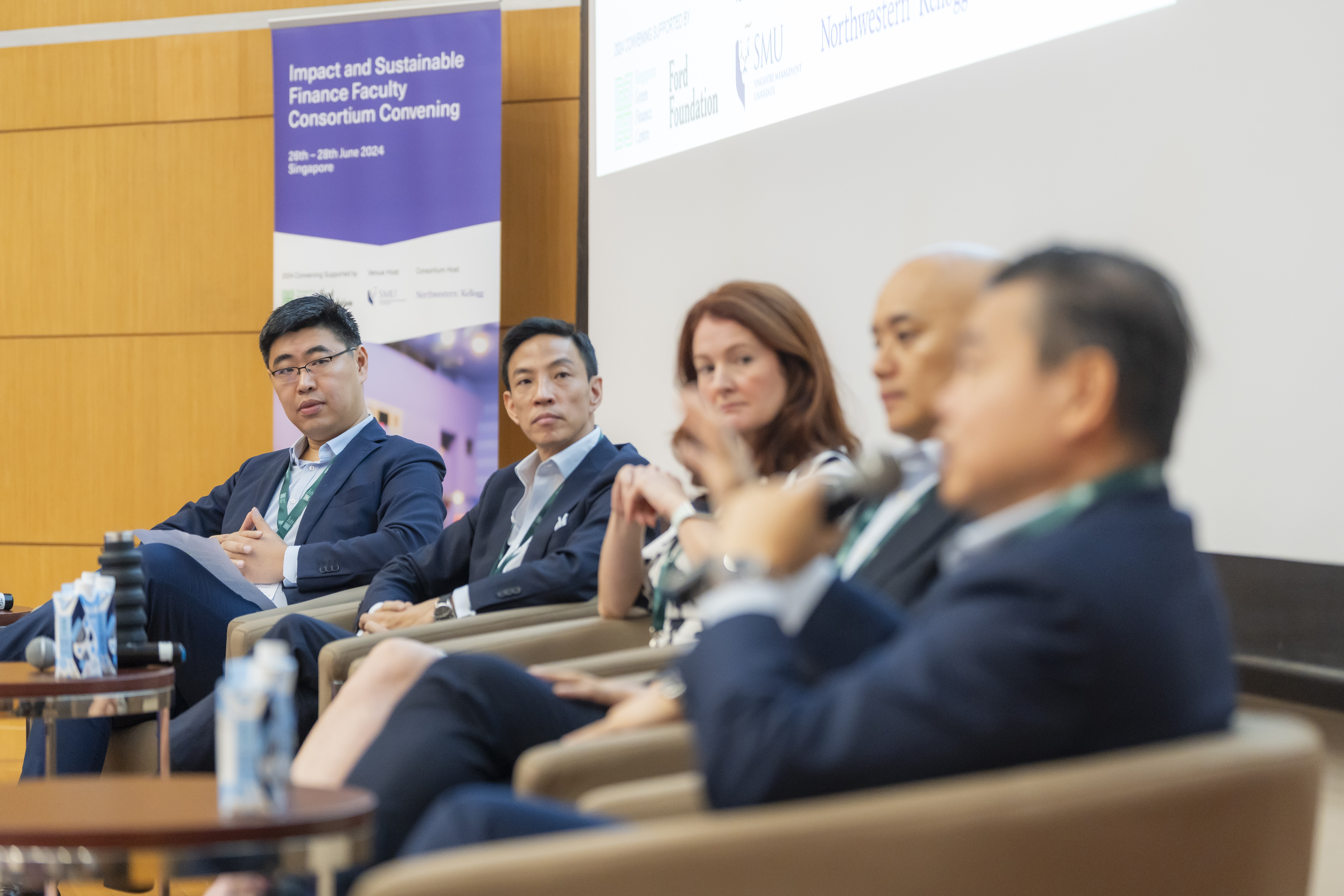
The Singapore Green Finance Centre hosted the Impact & Sustainable Finance Faculty Consortium Convening 2024 at the Singapore Management University from June 26 to 28.
The Consortium is a community of faculty members from universities around the world who teach and research in the space of impact investing and sustainable finance. The invitation-only event attracted over 100 international participants, consisting mainly of consortium members, expert guest speakers who are practitioners from the industry, regulators and SGFC founding partners.
About the Consortium
The steering committee of the consortium comprises faculty members from business schools from the United States, Europe and Asia. They include Kellogg School of Management of Northwestern University, Harvard Business School of Harvard University, the School of International and Public Affairs of Columbia University, European Centre for Corporate Engagement of Maastricht, and Lee Kong Chian School of Business (LKCSB) of SMU.
This annual convening of the consortium was hosted for the first time outside Chicago, against an Asian backdrop in Singapore. Through a series of panel discussions and breakout sessions, including one with a speaker from the Monetary Authority of Singapore (MAS), members learnt how Singapore manages its policies and operations in sustainable finance.
The role of SGFC in sustainable finance in Singapore
In his welcome remarks, the Dean of SMU LKCSB, Professor Bert de Reyck, shared that SMU is at the forefront of sustainability education. He said that SMU integrates sustainability into all its schools and educational programmes, and every student takes courses on sustainability, regardless of their field of study. From August 2024, SMU will also welcome its first batch of full-time and part-time Master of Sustainability students. He commended SGFC on its research on sustainability, particularly in impact investing, sustainable finance, and measuring impact.
SGFC is Singapore’s first Centre of Excellence to drive Asia-focused green finance research and talent development, supported by MAS and leading financial institutions. Since its inception four years ago, SGFC has conducted research on various sustainable finance topics such as transition finance, adaptation resilience, carbon markets, nature and biodiversity, and impact.
SGFC Centre Director, Nikki Kemp, said: “An important research topic that SGFC is working on, under the leadership of Associate Professor Hao Liang, is the development of frameworks to measure and understand impact. SGFC collaborates with industry partners on data sets, case studies, and other real-world inputs. Our researchers and industry partners co-author thought pieces that provide practical insights from academic research. We also host roundtable series across our key research topics where we gather industry partners and relevant stakeholders and facilitate discussions to generate solutions.”
SGFC also designs and delivers education programmes on sustainable finance for undergraduates, postgraduates, and executives at SMU. Earlier this year, SGFC announced courses to support the Sustainable Finance Jobs Transformation Map, unveiled by MAS and the Institute of Banking and Finance.
Driving changes in sustainable finance
The two-and-a-half-day convening opened with a plenary session on ‘Sustainable Finance in Asia: Transition Challenges, Solutions, and Impacts.’ It was moderated by Assoc Prof of Finance Liang Hao, who is also the recipient of the Ho Bee Professorship in Sustainability Management.
Among several prominent issues in Asia’s sustainable finance space, Assoc Prof Liang and panellists highlighted the necessity and promise of transition finance. This approach focuses on providing financing to assist businesses, particularly those in hard-to-abate sectors, to adopt renewable energies and integrate clean technologies into their production processes. This is especially pertinent in Asia due to the region’s rapid industrialisation and heavy reliance on manufacturing and fossil fuels. Transition finance aims to facilitate the shift towards more sustainable practices, addressing both environmental impact and economic resilience in the face of global climate challenges.
Said Assoc Prof Liang, “Panellists discussed how greenwashing can happen when financiers provide capital to ‘brown’ firms without helping them become greener, and this can undermine the credibility and effectiveness of transition finance and hinder the transition to a low-carbon economy. The challenges of detecting and preventing greenwashing by asset managers include the lack of standardised definitions, metrics, and disclosures for ESG factors, and the limited regulatory oversight and enforcement.”
The panellists concluded that more collaboration and coordination among regulators, asset managers, rating agencies, and investors were needed to combat greenwashing and boost transparency and accountability in sustainable finance.
The mental and social dimensions
In the final session, entitled ‘Harnessing our Collective Wisdom: Reflections on the Convening’, the discourse shifted to practical realities. Led by moderator, Professor Meeta Kothare of the University of Texas at Austin, the panellists were Ms Natalie Nietsch, the Global Head of Social Sustainability at Standard Chartered Bank and Dr Rajiv Lall, a Professorial Research Fellow of SMU.
When asked by Prof Kothare to reflect on the learnings at the convening, Dr Lall said he was struck by the fact that the crucial issue underlying problems with sustainable finance is human conditioning itself.
He said, “At a very deeply philosophical level, it strikes me that what we're all trying to do here is to attack the meta problem of how to induce the behavioural and attitudinal changes necessary to help the world transition to a more sustainable way of working. A lot of people are working to develop the knowledge and skills required for this transition, but the fundamental duty or focus for us educators in this room is to work on the mindset because that's where the conditioning starts.”

